
Paul Hekimian inspects a honeycomb forming in one of the hives behind his home (via argonautnews.com)
Backyard beekeepers work to save the local honeybee population from collapse
Story by Rebecca Kuzins via argonautnews.com
Most people who discover a beehive in their backyard would be glad to see it gone.
Paul Hekimian is not like most people.
After discovering a hive in an avocado tree behind his Santa Monica home in 2012, Hekimian — with help from Del Rey beekeeper Rob McFarland — moved the bees into brooding boxes, which provide ideal conditions for a hive. Since then, he has been raising honeybees, extracting and bottling honey, and even adopting more bees by rescuing swarms that have gathered at places such as Tongva Park and the Santa Monica Pier.
Hekimian is part of a new breed of urban beekeepers who’ve developed organic, pesticide- and chemical-free techniques to raise smaller hives with more disease-resistant honeybees. But the way Hekimian tells it, he just sets up his brooding boxes and then leaves the bees alone so they can produce honeycombs — and more bees.
“At the end of the day, the bees do all the work,” said Hekimian, a father of two young boys who also has his hands full running both a wholesale bakery and a technology consulting business. “You’ve heard the phrase ‘busy as a bee.’ These bees are very busy.”
Hekimian’s work and that of other backyard beekeepers is more than just a hobby. It’s also an environmentally minded response to the colony collapse disorder that has plagued honeybees for almost a decade and threatens the very future of agricultural and natural ecosystems.
Save the bees, save ourselves
In 2006, beekeepers began noticing that many worker bees had abandoned their hives, resulting in a loss of one-third of the nation’s honeybees. Since then, bees have continued to disappear, with scientists and researchers citing several possible reasons for the loss. Some argue that a fungus or virus is responsible, or that the bees have died from poor nutrition or parasites. More recently, numerous articles in scientific journals maintain a specific group of pesticides is the cause of the problem.
The sudden and rapid decline of the bee population has gotten the attention of President Barack Obama, who had two hives installed at the White House garden this summer — making him the nation’s most high-profile urban beekeeper.
In June, Obama created a Pollinator Task Force to establish a federal strategy aimed at promoting the health of honeybees and other pollinators.
“Honeybee pollination alone adds more than $15 billion in value to agricultural crops each year in the United States,” reads a statement announcing the task force. “Severe yearly declines create concern that bee colony losses could reach a point from which the commercial pollination industry would not be able to adequately recover.”
Or, as Hekimian says it: “If the bees go, they’re taking us with them. One in three pieces of food is touched by bees.”
Already struggling with drought, California’s almond industry also relies on bees for pollination. Bees also play a significant role in pollinating strawberries, watermelon, broccoli, squash and myriad other agricultural and other plants.
Some cities have responded to colony collapse disorder by legalizing beekeeping on private property, and the Santa Monica City Council adopted such an ordinance in 2011.
“The city council recognized bees are a very important link in the food chain,” said Dean Kubani, director of the city’s Office of Sustainability and the Environment. “Bees play so many important roles in the production of fruit and vegetables and most of what we eat. … I think in the past, there was a fear that bees in urban and suburban areas would harm people. That has shown not to be the case.”
The fight to legalize bees in L.A.
The Los Angeles City Council has been studying how the city could adopt its own backyard beekeeping ordinance since February. Some Los Angeles residents, like Rob and Chelsea McFarland, are already keeping bees. Founders of the nonprofit organization Honey Love, the couple has conducted an extensive neighborhood outreach and lobbying campaign in favor of a bee-positive city ordinance.
Chelsea McFarland said she and her husband made the decision to become beekeepers after a swarm showed up in the backyard of their Del Rey home.
“We have an organic garden and we knew about [colony collapse disorder]. We knew the bees were in trouble,” she said.
When the McFarlands contacted the city for advice about handling the swarm, they were told “the only thing to do was exterminate [them],” she recalled. “That’s still the case. Part of the [city’s] policy should be not only to legalize [beekeeping] … but to try and rescue rather than exterminate.”
Sylvia Henry is also a Los Angeles beekeeper and Honey Love member. She started keeping honeybees in March after Hekimian brought a swarm to her Mar Vista home, where her hive shares space in the backyard with eight chickens. “I’m an old farm girl,” Henry said. “I grew up on a farm in Chino.”
Henry said she is “thrilled” with her hive, which has already produced 30 pounds of honey. She’s “read all of the books in the library on bees” and is fascinated by the “whole entire cycle” of beekeeping and the “social set-up” of honeybees.
Not far from Henry’s backyard, another group of bees live on the roof of Louie’s of Mar Vista, a popular neighborhood restaurant and bar on Grand Avenue south of Venice Boulevard.
John Atkinson and his wife Laura opened the restaurant last year at the site where his grandfather, Bill Atkinson, and Bill’s buddy Louie operated a butcher shop from 1954 to 1969.
While renovating the property, John Atkinson noticed a swarm of bees had gathered inside a large sign above the building.
“Rather than poison them, we got them out of the sign and cut off access for them to get back into the sign,” he recalled.
The bees were placed in hive boxes on the restaurant’s roof, and Atkinson hired a beekeeper to take care of them. Over the past year, the population of what the restaurant’s website calls “Mar Vista’s bees” has increased threefold.
Louie’s of Mar Vista uses honey from these hives in some of its dishes and to create its signature Bee Sting cocktail — a combination of applejack brandy, ginger beer, lemon and honey, served with a slice of lime and a mix of sugar and ginger around the rim of the glass.
“It’s not like having a goldfish”
As part of its education and support mission, HoneyLove conducts monthly seminars, including some at its bee sanctuary in Moorpark, to train backyard beekeepers.
“It’s not like having a goldfish,” Chelsea McFarland said. “You definitely want to know what you’re doing.”
Hekimian, on the HoneyLove board of directors, agrees that wanna-be beekeepers need training before they can graduate to get a beehive.
Beekeeping, Hekimian adds, is the art of observation: “You watch the behavior of the bees as they go in and out the front door. Are they going out? Are they bringing in pollen?”
Beekeeping comes fairly naturally to Hekimian. His father, Kevork G. Hekimian, kept bees when Paul was growing up in Houston.
“My dad started out with a couple of hives and then had 60 hives,” he said. “I got him back into beekeeping,” Hekimian said of his father. “It’s come full circle.”
[read the full article via argonautnews.com]


 follow
follow  watch
watch  subscribe
subscribe 






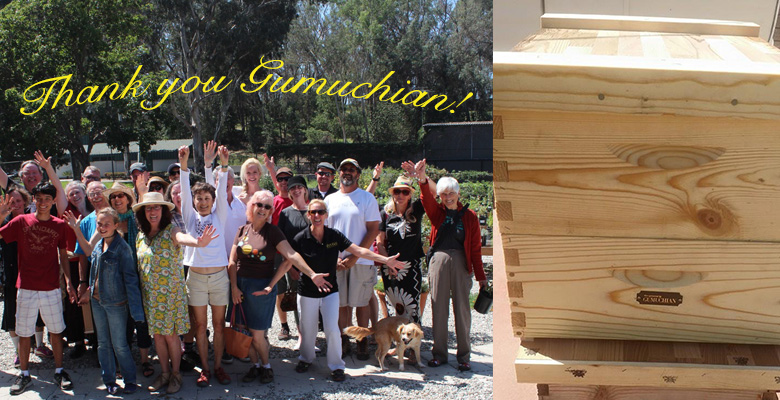

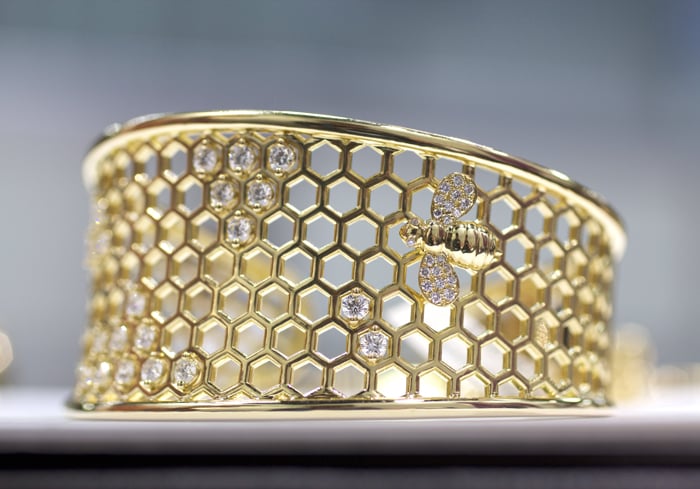
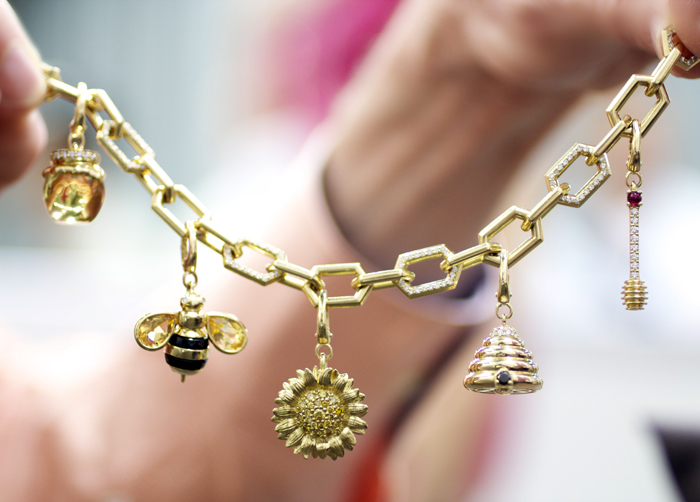
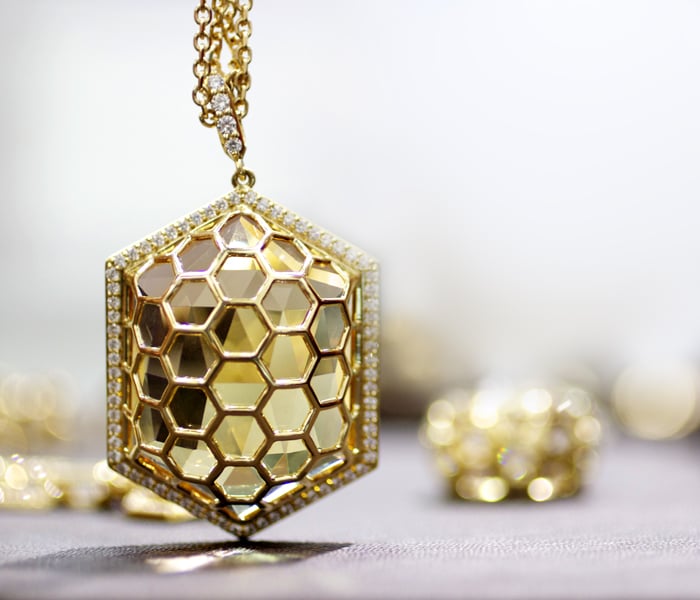

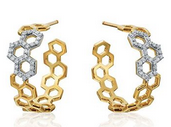




 Become a member of HoneyLove and learn to be an urban beekeeper!
Become a member of HoneyLove and learn to be an urban beekeeper!
 Plant an organic garden without the pesticides that harm honeybees!
Plant an organic garden without the pesticides that harm honeybees!
 Provide a water source on your property – bees love clean water to drink!
Provide a water source on your property – bees love clean water to drink!